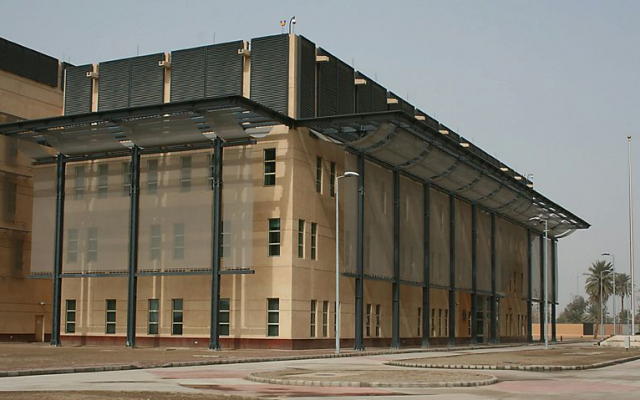Two rockets explode near US embassy in Baghdad amid US-Iran tensions

BAGHDAD — Two rockets landed near the US embassy in Baghdad overnight, security sources told AFP early Tuesday, with foreign diplomats there reporting emergency sirens repeatedly going off.
The latest attack within the walled-off Green Zone, which hosts foreign embassies and Iraqi government buildings, comes amid heightened tensions between Baghdad’s two main allies, Tehran and Washington.
A foreign security source inside the Green Zone said two 100mm rockets hit close to the US embassy and a third fell into the Tigris River, which the embassy overlooks.
“One hit about three meters (10 feet) inside a gate on the embassy compound,” the source told AFP.
An Iraqi security source confirmed to AFP that two Katyusha rockets landed near the embassy shortly before midnight.
They were found to have been fired from an area in southern Baghdad where Iraqi paramilitary forces close to Iran hold sway.
The Iraqi military said two projectiles hit the edges of the Green Zone.
None of the sources mentioned any casualties and no group claimed responsibility for the attacks.
Foreign diplomatic sources within the zone said US embassy sirens wailed across the area twice, and stopped shortly before 1 a.m. local time on Tuesday morning.
The last rocket attack on the Green Zone took place on May 19, just days after the US announced an “ordered departure” of all non-essential diplomatic staff in Iraq.
After decades of back-to-back conflicts, Iraq has enjoyed a period of relative stability since declaring victory over the Islamic State jihadist group in late 2017.
In a sign of the improving security situation, Iraqi authorities have been working since last year to loosen security restrictions around the Green Zone.
Concrete blast walls have been removed and through-traffic has been allowed for the first time in over a decade, but the US embassy remains one of the most highly-secured area in the zone.
Baghdad has also tried to position itself as a potential mediator between the US and Iran, which have been at loggerheads since Washington unilaterally withdrew from the landmark 2015 nuclear deal with Tehran last year.
Since that move, tensions have spiraled between the two countries, with Iraq — where both countries enjoy significant political and military influence — caught in the middle.
The risk of a proxy war seemed particularly high this summer, when a string of mysterious blasts hit weapons depots and other bases used by pro-Iran paramilitary forces known as the Hashed al-Shaabi.
The Hashed blamed the US and Israel, with its political branch calling the attacks “a declaration of war” and resuming its calls for US troops to leave the country.
Read more: The Times of Israel